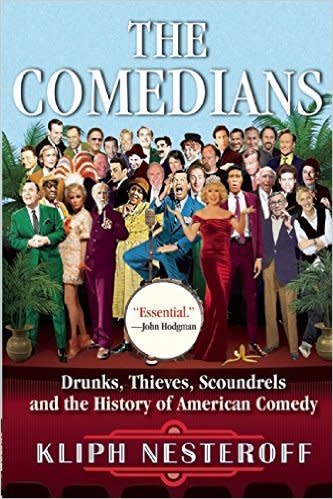'The Comedians': Everything You Want To Know About Comedy

It’s no small accomplishment to tell the story of American comedy from the turn of the 20th century to the present, but Kliph Nesteroff has done it in his new book The Comedians (Grove Atlantic). It’s even more of an accomplishment to make this story a lively one — the author crams the book with funny and gleefully appalling examples and anecdotes, as befits a volume whose subtitle is “Drunks, Thieves, Scoundrels and the History of American Comedy.”
Anyone who thinks Amy Schumer is super-edgy and that sketch comedy peaked with Mr. Show or The State or The Kids In The Hall needs to read Nesteroff’s book. Not taking anything away from any of the acts I just named, it would be good (entertaining and educational) for you to become familiar with, say, the acerbic pessimism of Henry Morgan, or the X-rated, pre-Sanford & Son Redd Foxx, or the work of Lorne Michaels that preceded his comedy-guru status with Saturday Night Live.
Nesteroff’s overarching idea in this book is that for every big-name star or trend in comedy (million-selling comedy records the 1960s, for example, or the comedy-club boom in the ‘80s), there are scores of comedians whose work has slipped into obscurity, and who exist now only as clips in the dustier corners of YouTube or as influences on more familiar, established names. It’s exceedingly difficult to convey what made any given comedian funny without quoting from the person’s act or describing his or her material at length, and Nesteroff avoids both of these methods. Instead, he summons up whole eras of show business, and places the performers in context. Thus there are fascinating chapters on how Las Vegas in the ‘50s and ‘60s influenced styles of comedy and how the rock & roll counterculture of the late-’60s and early-’70s compelled a different kind of performance. In this way, Nesteroff avoids having to quote great swatches of material from, say Buddy Hackett or Phyllis Diller or George Carlin, yet communicates precisely what their significance was to comedy.
As someone who’s loved watching comedians on TV since I was a kid, I thought I was only person who knew or remembered obscure names like Pete Barbutti, Woody Woodbury, Rusty Warren (did you know there was a female comic whose catchphrase “Knockers up!”?), and Tim Thomerson (whom I once saw in a La Jolla, California, nightclub doing hilarious improv that thoroughly embarrassed my mother-in-law).
I learned stuff, too: I never knew that Fred Willard used to do a duo act with a comic named Vic Grecco, and that comics like screenwriter Buck Henry said they were superb. (I can’t find so much as a second of their act on the internet.)

The Comedians is immensely entertaining, a fast read that’s also a deep dive.


